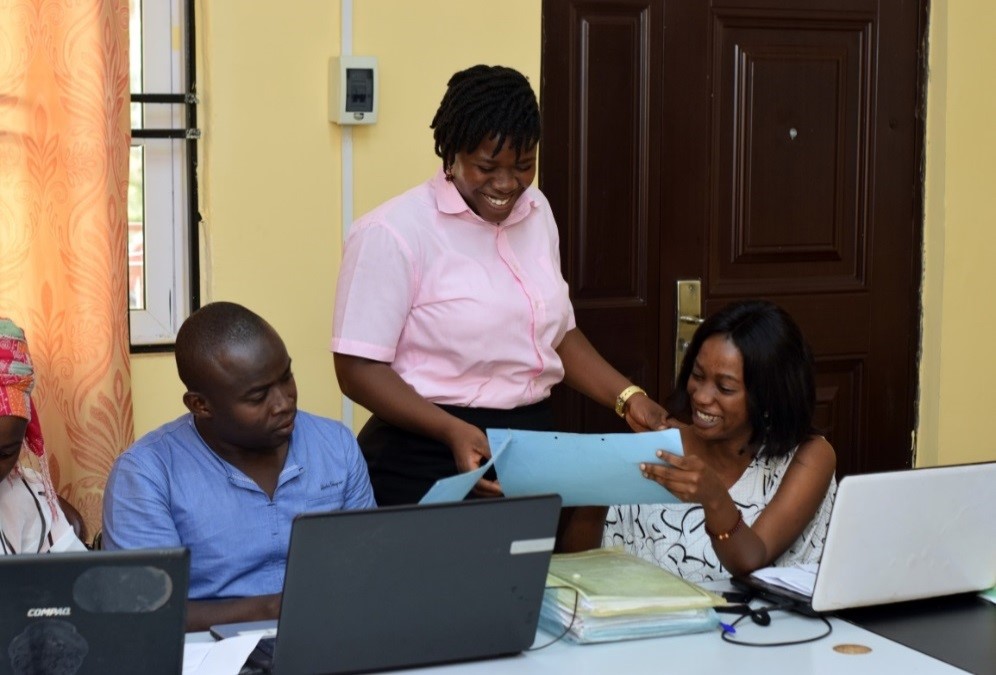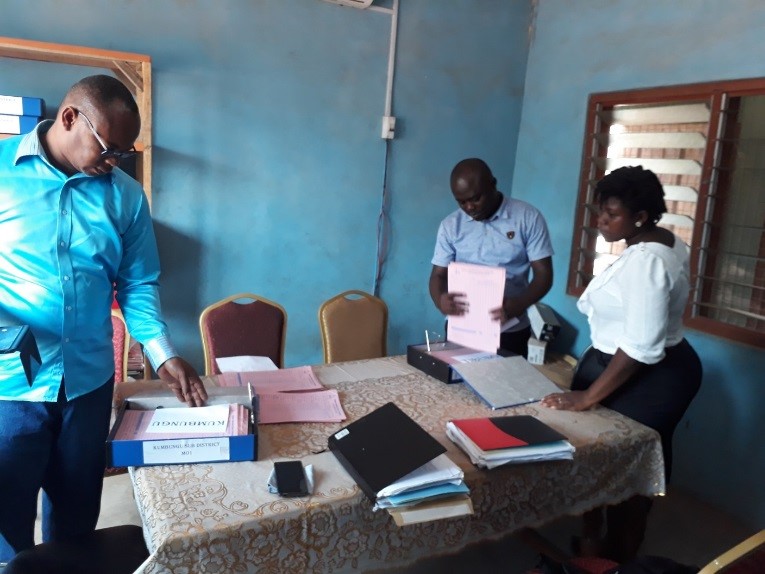Tamale, Ghana:
Peace Dellor began working on the PMI Africa Indoor Residual Spraying Project (AIRS) in 2015 as a Data Entry Clerk in Ghana. Due to her diligence and hard work she was promoted to be the Monitoring and Evaluation (M&E) Assistant for Kumbungu District, one of the seven districts targeted by PMI VectorLink, which followed after the AIRS Project ended in 2017. Peace, who comes from Keta in the Volta Region of southeastern Ghana, studied at the Intercom Programming and Manufacturing Company Limited in Tamale and holds a diploma in Database Technology. Dellor recently talked about her experience with malaria and her role on the PMI VectorLink Project.

PMI VectorLink: Have you had any experience with malaria?
Dellor: Yes, I remember when I was admitted to the hospital for days because I had malaria. This caused me to miss classes. It took me time to recover and go back to school to catch up with my colleagues.
PMI VectorLink: What are your duties as the M&E Assistant for the Kumbungu District?
Dellor: My role is critical as I have to ensure that accurate data is reported to the project. Here are some of my core duties:
- Train Spray Operators on spray data recording at the district level.
- Supervise Data Entry Assistants to enter data on a daily basis.
- Verify data cards by using the error eliminator.
- Sample some compounds to verify spraying.
- Assist the District Operations Coordinator in planning.
- Supervise Spray Operators’ data recording in the field.
For malaria prevention, I visit some of the difficult communities (that tend to refuse spraying) to talk to them about the benefits of the project. I go the extra mile in helping them to pack their belongings and get a Spray Operator to spray their rooms.
PMI VectorLink: Do you think Ghana will ever be malaria free?
Dellor: Yes, because if we can sustain the effort and also if we can be as resilient as the malaria parasite, we can make Ghana malaria free.
PMI VectorLink: What has surprised you most about working with the PMI VectorLink Project?
Dellor: I am always surprised about the energy and the zeal some workers and community members who understand the aim and benefits of the project apply to their work.
PMI VectorLink: What do you find most challenging about your job?
Dellor: In my line of work, I do need a means of transportation to carry out field supervision. However, this was not always readily available. Dialects of the language commonly used in the district, Dagbanli, sometimes serve as a barrier and lead to misperceptions about the project
PMI VectorLink: How did the project address these issues?
Dellor: The project provided a motorbike to enable me to carry out my duties.
In dealing with the dialect problem, I was able to get other people in the area to help me to communicate and overcome the language barrier.
To address misconceptions about the project, I used IRS messaging, such as the benefits and effectiveness of IRS, and worked with advocates of the project in the communities to help change false perceptions.
PMI VectorLink: What impact has the entomological monitoring had on malaria in Ghana?
Dellor: The entomological monitoring team selects the correct insecticide to be used for spraying each year and monitors how the program is affecting the mosquito population and their ability to transmit malaria. This monitoring is critical in helping us make informed decisions on the appropriate measures to take in helping to reduce malaria prevalence.

PMI VectorLink: What changes have you seen in IRS implementation since the project began?
Dellor: There have been some impressive changes in IRS implementation because the acceptance rate has increased, support from some communities is very high and the passion of workers on this project has also increased.
PMI VectorLink: How has the incidence of malaria changed since you began working for this project?
Dellor: There is a remarkable report by Ghana Health Service on how malaria has reduced at the number of out-patient cases, and my personal encounter with some community members tells me that there has been a significant reduction in reported malaria cases.
PMI VectorLink: What do you wish people knew about the project?
Dellor: PMI VectorLink is a project one has to embrace because it comes with personal hygiene in that community members use it as an opportunity to clean up their rooms. Aside from targeting mosquitoes, the chemical kills some other insects which are nuisance to the communities. This project aims at protecting our people.
PMI VectorLink: What might someone be surprised to know about you?
Dellor: I am very friendly despite the rigorous nature of my role.
PMI VectorLink: What is your hope from the project?
Dellor: My hope for the project is that in some years to come Ghana will be malaria free and in the unlikely event when PMI pulls out, the Ghana government will be able to take over.
PMI VectorLink: What kind of impact have you seen from the project?
Dellor: PMI VectorLink has not only reduced malaria cases but has also reduced the unemployment rate. It serves as a source of income for many who use money earned from the project to finance their education, purchase inputs for their farms, set up a business or learn a trade.

